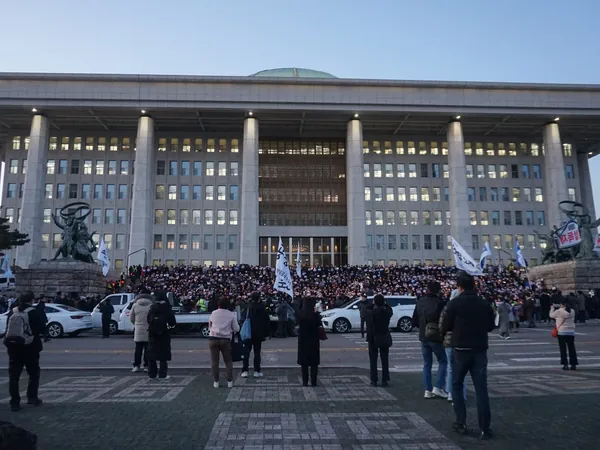
South Korea's Unprecedented Martial Law: A Brush with History's Shadows
2024-12-04
Author: Ying
South Korea's Unprecedented Martial Law: A Brush with History's Shadows
Seoul, South Korea – In a shocking turn of events, many South Koreans awoke on Wednesday to a reality no one anticipated. The previous night, President Yoon Suk Yeol invoked martial law in a desperate attempt to consolidate power amid escalating political turmoil.
Using vague and alarming rhetoric, Yoon justified his extraordinary measure by claiming the need to "protect the country from North Korean communists and eliminate antistate elements" while expressing a sense of urgency to "rebuild and protect the country from falling into ruin." As midnight approached, troops were dispatched to encircle the National Assembly, aiming to prevent lawmakers from challenging his controversial decision.
However, Yoon's ambitious plan quickly unraveled. Members of the National Assembly defied his blockade, convening to vote on the repeal of martial law, which had lasted a mere two hours. By dawn, South Korea had narrowly escaped what could have been its first coup attempt in over four decades.
As the sun rose over Seoul, life resumed its usual rhythm for students on university campuses and office workers bustling through city centers. Yet, outside the National Assembly building, tensions remained high. Hundreds of demonstrators gathered, led by members of the opposition Democratic Party, who were gearing up to introduce an impeachment bill against Yoon, hoping to secure its passage by Saturday.
Frustrated protesters called for Yoon's immediate resignation. Notably, 44-year-old Shin Byung-soo expressed discontent: “There was no procedural legitimacy at all in the president’s actions,” he said, holding a candle among fellow demonstrators. “He disregarded the wellbeing and intelligence of our people, making unilateral decisions with unprecedented consequences.”
Min Jun-shik, 43, who was capturing the protests with his camera, maintained that Yoon “lacks the qualities of a true president” and hoped for his swift resignation. Reflecting on the atmosphere among colleagues in his office, he remarked on the surreal nature of Yoon's move, drawing parallels to the 2017 impeachment of former President Park Geun-hye, who was ousted for corruption linked to extralegal influences.
“The state of our economy is dire, and many are struggling to make ends meet. This incident only exacerbates the situation,” Min stated, criticizing the significant decline of the South Korean won and the stain left on the nation’s reputation.
Experts weighed in on the consequences of Yoon's actions. Chung Joo-shin, director of the Korea Institute of Politics and Society, argued that Yoon's imposition of martial law undermined South Korea's hard-won global standing as a democratic nation. “When people around the world think of South Korea, they remember its remarkable democratic achievements, which have driven unprecedented growth. Yoon's actions, however, reveal how far we still have to go to be considered an advanced democratic society,” he said.
Chun, another political analyst, posited that with Yoon facing record-low approval ratings due to rampant inflation and ongoing scandals, he attempted an ill-conceived maneuver for political survival. Recently, his popularity dropped to a staggering 25 percent as citizens grappled with the ramifications of his choices.
The country’s history with martial law echoes back to the era of military dictatorships, with such moves only invoked during those turbulent decades before democracy was reclaimed in 1988. The memory of the Gwangju uprising in May 1980, a tragic event where hundreds of protesters lost their lives due to state violence, loomed over the current situation.
For individuals like Jeon Hyun-jung, 33, whose mother witnessed the Gwangju protests, the prospect of returning to martial law was deeply unsettling. “When I called my friend in Seoul, I could hear helicopters and armored vehicles in the background. I truly feared for the safety of the people,” she recalled.
Yet when the National Assembly voted to rescind martial law, a wave of relief washed over Jeon as she settled in for the night, hopeful that normalcy would return. “Many of my South Korean friends went to bed like me, but it was our friends abroad who expressed disbelief at what was happening in our country,” she shared.
Similarly, Lee Gil-bok, a resident of Paju, felt a cautious optimism. However, the events of Tuesday night prompted her to reconsider the future for her grandchildren. “It feels like the leaders we have today aren’t figureheads our children can look up to. Politicians seem more interested in their own agendas, and trust in those in power is at an all-time low,” she lamented.
As South Korea grapples with the aftermath of this unprecedented event, the nation stands at a crossroads, reflecting on its democratic values and the fragile nature of governance. Will Yoon Suk Yeol face the reckoning many demand, or will history repeat itself as citizens remain vigilant in their pursuit of accountability and justice? Only time will tell.


 Brasil (PT)
Brasil (PT)
 Canada (EN)
Canada (EN)
 Chile (ES)
Chile (ES)
 España (ES)
España (ES)
 France (FR)
France (FR)
 Hong Kong (EN)
Hong Kong (EN)
 Italia (IT)
Italia (IT)
 日本 (JA)
日本 (JA)
 Magyarország (HU)
Magyarország (HU)
 Norge (NO)
Norge (NO)
 Polska (PL)
Polska (PL)
 Schweiz (DE)
Schweiz (DE)
 Singapore (EN)
Singapore (EN)
 Sverige (SV)
Sverige (SV)
 Suomi (FI)
Suomi (FI)
 Türkiye (TR)
Türkiye (TR)